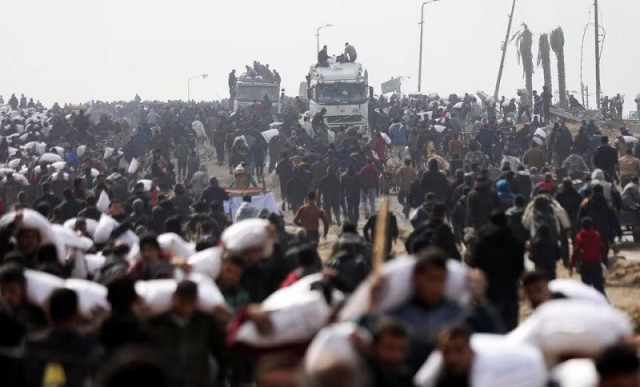US proposes UN Security Council oppose Rafah assault, back temporary Gaza ceasefire
United States draft UN resolution condemns Israeli calls for settlers in Gaza, opposes reducing Gaza's territory

The United States has proposed an alternative draft United Nations Security Council resolution calling for a temporary ceasefire in the Israel-Hamas war and opposing a major Israeli ground offensive in Rafah in southern Gaza, according to the text seen by Reuters on Monday.
Washington has been averse to the word ceasefire in any UN action on the Israel-Hamas war, but the US draft text echoes language that President Joe Biden said he used last week in conversations with Israel's Prime Minister Benjamin Netanyahu.
The US draft text "determines that under current circumstances a major ground offensive into Rafah would result in further harm to civilians and their further displacement including potentially into neighbouring countries."
Israel plans to storm Rafah, where more than 1 million of the 2.3 million Palestinians in Gaza have sought shelter, prompting international concern that such a move would sharply worsen the humanitarian crisis in Gaza.
Read also: UN likely to vote Tuesday on Gaza ceasefire, US signals veto
The draft US resolution says such a move "would have serious implications for regional peace and security, and therefore underscores that such a major ground offensive should not proceed under current circumstances."
It was not immediately clear when or if the draft resolution would be put to a vote in the 15-member council. A resolution needs at least nine votes in favour and no vetoes by the United States, France, Britain, Russia or China to be adopted.
The US put forward the text after Algeria on Saturday requested the council vote on Tuesday on its draft resolution, which would demand an immediate humanitarian ceasefire in the Israel-Hamas war. US Ambassador to the UN Linda Thomas-Greenfield quickly signalled that it would be vetoed.
Rejects buffer zone
Algeria put forward an initial draft resolution more than two weeks ago. But Thomas-Greenfield said the text could jeopardise "sensitive negotiations" on hostages. The US, Egypt, Israel and Qatar are seeking to negotiate a pause in the war and the release of hostages held by Hamas.
Washington traditionally shields its ally Israel from UN action and has twice vetoed council resolutions since Oct. 7. But it has also abstained twice, allowing the council to adopt resolutions that aimed to boost aid to Gaza and called for urgent and extended humanitarian pauses in fighting.
The draft US text would condemn calls by some Israeli government ministers for Jewish settlers to move to Gaza and would reject any attempt at demographic or territorial change in Gaza that would violate international law.
The resolution would also reject "any actions by any party that reduce the territory of Gaza, on a temporary or permanent basis, including through the establishment officially or unofficially of so-called buffer zones, as well as the widespread, systematic demolition of civilian infrastructure."
Read: Israel to set security limits on Ramazan prayers at Jerusalem's Al Aqsa
Reuters reported in December that Israel told several Arab states that it wants to carve out a buffer zone inside Gaza's borders to prevent attacks as part of proposals for the enclave after the war ends.
The war began when fighters from the Hamas group that runs Gaza attacked Israel on Oct. 7, killing 1,200 people and capturing 253 hostages, according to Israeli tallies. In retaliation, Israel launched a military assault on Gaza that health authorities say has killed more than 28,000 Palestinians with thousands more bodies feared lost amid the ruins.
In December, more than three-quarters of the 193-member UN General Assembly voted to demand an immediate humanitarian ceasefire. General Assembly resolutions are not binding but carry political weight, reflecting a global view on the war.
UN Secretary-General Antonio Guterres has long called for a humanitarian ceasefire in Gaza. UN aid chief Martin Griffith warned last week that military operations in Rafah "could lead to a slaughter."



















COMMENTS
Comments are moderated and generally will be posted if they are on-topic and not abusive.
For more information, please see our Comments FAQ